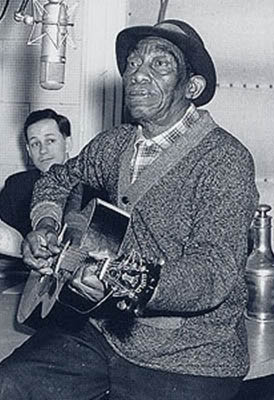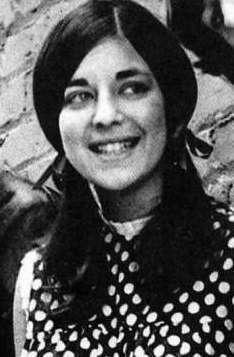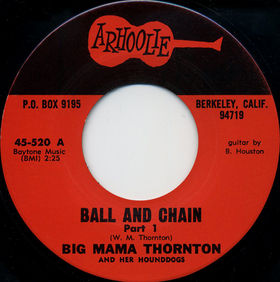
Lemon Henry "Blind Lemon" Jefferson was an American blues and gospel singer-songwriter and musician. He was one of the most popular blues singers of the 1920s and has been called the "Father of the Texas Blues".

John Smith Hurt, better known as Mississippi John Hurt, was an American country blues singer and guitarist.

Jefferson Airplane was an American rock band based in San Francisco, California, that became one of the pioneering bands of psychedelic rock. Formed in 1965, the group defined the San Francisco Sound and was the first from the Bay Area to achieve international commercial success. They headlined the Monterey Pop Festival (1967), Woodstock (1969), Altamont Free Concert (1969), and the first Isle of Wight Festival (1968) in England. Their 1967 breakout album Surrealistic Pillow was one of the most significant recordings of the Summer of Love. Two songs from that album, "Somebody to Love" and "White Rabbit", are among Rolling Stone's "500 Greatest Songs of All Time".

Lizzie Douglas, better known as Memphis Minnie, was a blues guitarist, vocalist, and songwriter whose recording career lasted for over three decades. She recorded around 200 songs, some of the best known being "When the Levee Breaks", "Me and My Chauffeur Blues", "Bumble Bee" and "Nothing in Rambling".
Lester Franklin Melrose was a talent scout who was one of the first American producers of Chicago blues records.

Surrealistic Pillow is the second album by the American rock band Jefferson Airplane, released by RCA Victor on February 1, 1967. It is the first album by the band with vocalist Grace Slick and drummer Spencer Dryden. The album peaked at number three on the Billboard album chart and has been certified Platinum by the RIAA. The album is considered to be one of the quintessential works of the early psychedelic rock and 1960s counterculture eras.

"When the Levee Breaks" is a country blues song written and first recorded by Memphis Minnie and Kansas Joe McCoy in 1929. The lyrics reflect experiences during the upheaval caused by the Great Mississippi Flood of 1927.

Willie Mae Thornton, better known as Big Mama Thornton, was an American singer and songwriter of the blues and R&B. She was the first to record Leiber and Stoller's "Hound Dog", in 1952, which became her biggest hit, staying seven weeks at number one on the Billboard R&B chart in 1953 and selling almost two million copies. Thornton's other recordings included the original version of "Ball and Chain", which she wrote.

Jorma Ludwik Kaukonen, Jr. is an American blues, folk, and rock guitarist. Kaukonen performed with Jefferson Airplane and still performs regularly on tour with Hot Tuna, which started as a side project with bassist Jack Casady, and as of early 2019 has continued for 50 years. Rolling Stone magazine ranked him No. 54 on its list of 100 Greatest Guitarists. He was inducted into the Rock and Roll Hall of Fame in 1996 as a member of Jefferson Airplane.
Wilbur "Kansas Joe" McCoy was an American Delta blues singer, musician and songwriter.
The Memphis Jug Band was an American musical group active from the mid-1920s to the late-1950s. The band featured harmonica, kazoo, fiddle and mandolin or banjolin, backed by guitar, piano, washboard, washtub bass and jug. They played slow blues, pop songs, humorous songs and upbeat dance numbers with jazz and string band flavors. The band made the first commercial recordings in Memphis, Tennessee, and recorded more sides than any other prewar jug band.

Jefferson Airplane Takes Off is the debut studio album by the American rock band Jefferson Airplane, released on 15 August 1966 by RCA Victor. The personnel differs from the later "classic" lineup: Signe Toly Anderson was the female vocalist and Skip Spence played drums. Both soon left the group—Spence in May 1966, Anderson in October—and were replaced by Spencer Dryden and Grace Slick, respectively.

Let It All Out is an album by Nina Simone, released by Philips Records in February 1966.

Signe Toly Anderson was an American singer who was one of the founding members of the American rock band Jefferson Airplane.

William "Casey Bill" Weldon was an American country blues musician.
"Ain't Nobody's Business" is a 1920s blues song that became one of the first blues standards. It was published in 1922 by Porter Grainger and Everett Robbins. The song features a lyrical theme of freedom of choice and a vaudeville jazz–style musical arrangement. It was first recorded, as "'Tain't Nobody's Biz-ness if I Do", in 1922 by Anna Meyers, backed by the Original Memphis Five.

"Ball and Chain" is a blues song written and recorded by American blues artist Big Mama Thornton. Although her recording did not appear on the record charts, the song has become one of Thornton's best-known, largely due to performances and recordings by Janis Joplin.

Jefferson Airplane Loves You is a three-CD boxed set of recordings by the San Francisco rock band Jefferson Airplane with extensive liner notes by Jeff Tamarkin, author of the Jefferson Airplane history Got a Revolution: The Turbulent Flight of Jefferson Airplane.
Ernest Lawlars was an American blues guitarist, vocalist, and composer, known professionally as Little Son Joe.
"Crawling King Snake" is a blues song that has been recorded by numerous blues and other artists. It is believed to have originated as a Delta blues in the 1920s and be related to earlier songs, such as "Black Snake Blues" by Victoria Spivey and "Black Snake Moan" by Blind Lemon Jefferson.













